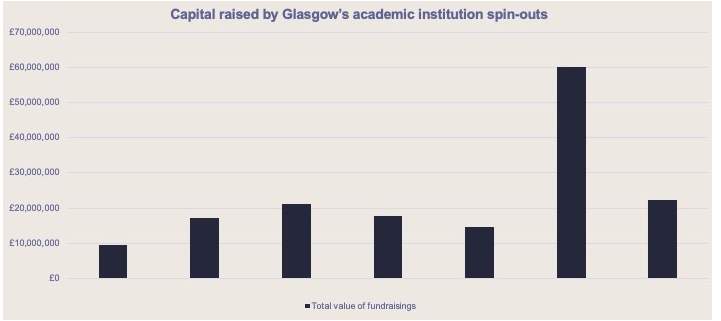The UK-wide battle for talent is at its absolute sharpest, and Glasgow’s growing skills and talent base will help to futureproof its growing economy. As of 2019, 46 per cent of Glasgow City Region residents have a degree, well above the UK average of 38 per cent and higher than in Manchester and Birmingham. Glasgow also ranks in the top 10 per cent of regions in Europe for the proportion of working-age adults with at least a degree-level qualification, as well as ranking number one among the 11 UK core cities for producing the highest number of digital tech graduates. While a degree is far from being exclusively indicative of talent and where it comes from, these stats help to demonstrate the potential for future growth in Glasgow.
With a significant talent pool coming through the key universities, Glasgow graduates moving into employment in the city are heavily biased towards the professional, scientific and tech sectors.
The universities themselves are promoting innovation and growth within Glasgow, and companies are having an ever greater appreciation for the expertise of academic researchers and how they can contribute to their business success. Universities can play a unique role in business start-up support – they not only finance incubators to support start-ups and contribute to their survival and growth, but these incubators are also managed by the university alongside spin-outs with other local businesses.
Glasgow City Innovation District (GCID) is the result of a successful partnership between Glasgow City Council, the University of Strathclyde, Scottish Enterprise, Glasgow Chamber of Commerce, and Entrepreneurial Scotland. The GCID has brought in new jobs, helped retention of talent, inward investment, and organisations with innovation at their core. Meanwhile, the University of Glasgow has taken possession of the former Western Infirmary site to enable a proposed £1 billion investment in the Gilmorehill campus. The masterplan for the 14-acre site includes the creation of a Research and Innovation Hub housing large-scale, interdisciplinary projects and incubator space for spin-out collaborations with industry, which should support economic development in the West End.
There has also been a growing success story when looking at spin-out companies from the academic institutions in Glasgow. The level of fundraising by companies that have emerged increased significantly last year, by over 300 per cent on the previous year, as the graph below shows. This funding will lead to increasing occupier demand as the companies enable their business plans.


-impact-the-office-sector(1).jpg)

.jpg)






